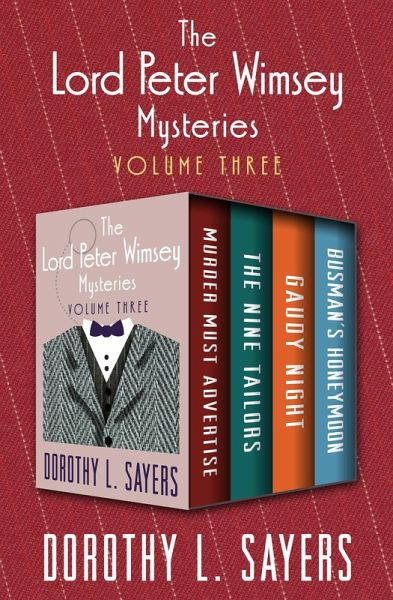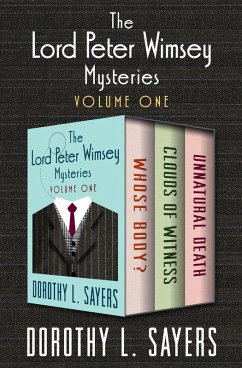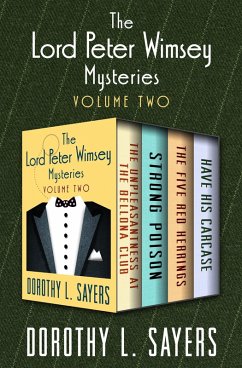
The Lord Peter Wimsey Mysteries Volume Three (eBook, ePUB)
Murder Must Advertise, The Nine Tailors, Gaudy Night, and Busman's Honeymoon

PAYBACK Punkte
0 °P sammeln!
No mystery can stump the British aristocrat and sleuth-in these four novels in the beloved series from "one of the greatest mystery story writers" ( Los Angeles Times). A gentleman needs hobbies. For Lord Peter Wimsey-a Great War veteran with a touch of shell shock-collecting rare books, sampling fine wines, and catching criminals are all most pleasant diversions. In these Golden Age whodunits, "Lord Peter can hardly be spared from the ranks of the great detectives of the printed page" ( The New York Times). Murder Must Advertise: The iron staircase at Pym's Publicity is a deathtrap, so no one...
No mystery can stump the British aristocrat and sleuth-in these four novels in the beloved series from "one of the greatest mystery story writers" ( Los Angeles Times). A gentleman needs hobbies. For Lord Peter Wimsey-a Great War veteran with a touch of shell shock-collecting rare books, sampling fine wines, and catching criminals are all most pleasant diversions. In these Golden Age whodunits, "Lord Peter can hardly be spared from the ranks of the great detectives of the printed page" ( The New York Times). Murder Must Advertise: The iron staircase at Pym's Publicity is a deathtrap, so no one in the advertising agency is surprised when Victor Dean tumbles down it, cracking his skull. His replacement arrives just a few days later-a green copywriter named Death Bredon. Though he displays a surprising talent for selling margarine, alarm clocks, and nerve tonics, Bredon is not really there to write copy. He is, in fact, Lord Peter Wimsey, come in search of the man who pushed Dean. The Nine Tailors: During their stay in the countryside, Lord Peter and his manservant Bunter encounter hospitality, dinner, and an invitation from the local rector to go bell ringing to welcome the New Year. They also encounter murder, a mutilated corpse, and a decades-old jewel theft for which locals continue to die. In this land where bells toll for the dead, the ancient chimes never seem to stop. Gaudy Night: When mystery novelist and acquitted murder suspect Harriet Vane returns to Oxford for her college reunion, she finds that her troubles are far greater than a damaged reputation. The first poison-pen letter calls her a "dirty murderess," and those that follow are no kinder. As the threats become more frightening, she calls on Wimsey for help. Among the dons of Oxford lurks a killer, but it will take more than a superior education to outwit the gentleman sleuth and his ladylove. Busman's Holiday: A murderer kills the mood for newlyweds Lord Peter Wimsey and Harriet Vane on their honeymoon, when they discover the house's caretaker bludgeoned to death in the manor's basement. In a house full of suspects, the only thing harder than finding the killer will be finding time to be alone.
Dieser Download kann aus rechtlichen Gründen nur mit Rechnungsadresse in A, B, BG, CZ, D, DK, EW, E, FIN, F, GR, HR, H, I, LT, L, LR, NL, PL, P, R, S, SLO, SK ausgeliefert werden.













